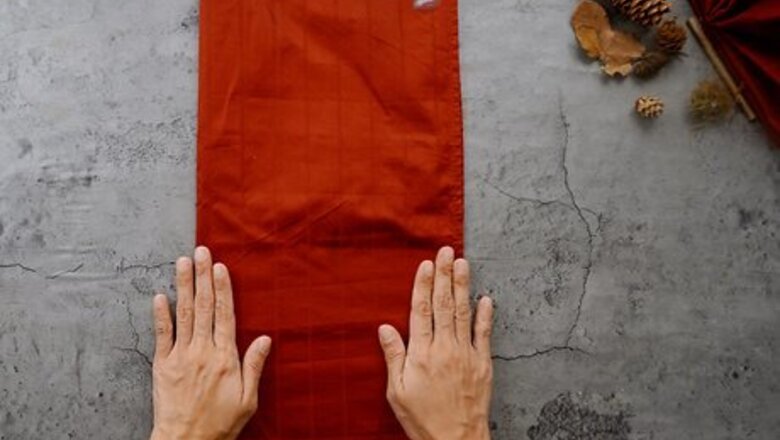
views
Folding a Standing Fan

Fold the napkin into a rectangle. You should begin with the napkin lying flat and unfolded. Take the right side of your napkin and match the right edge to the left edge. You want to make sure that the sides are perfectly matched the whole way. Then press down on the fold to make a sharp crease. Your square napkin should now look like a rectangle.
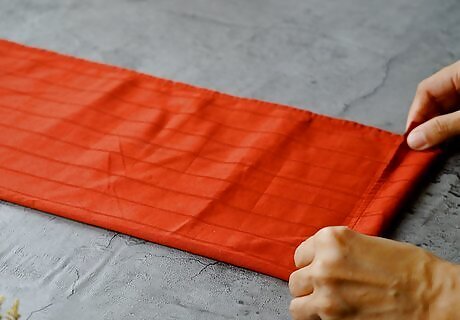
Create the first fan pleat. With the rectangle's long sides to the left and right, grasp the edge of the short side closest to you and fold it up toward its body. The first fold will determine how large the pleats for the fan will be, so determine for yourself if this is how big you want them to be. There is no right or wrong answer to this, just personal preference. Once the pleat is the size you want it to be, press down on the fold to make a sharp crease. To make a bigger pleat, make the size of the folded over portion bigger. To make a smaller pleat, make the size of the folded over portion smaller.
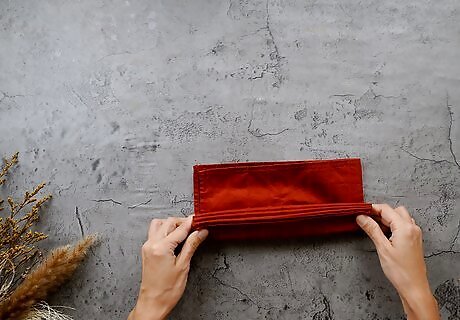
Create an accordion fold. Gripping the area you just folded over and creased, raise it again to fold away from you. However, this time you will want to fold a width twice as wide as before. Before you make the crease like in the previous step, gather half of the folded area and fold it back toward you. This will create a series of folds that stack on top of each other like an accordion. Alternatively, you can create the accordion fold by first folding one way and then the opposite way, stacking the napkin's pleats on top of each other as you go. Continue this process about halfway up the rectangle, maintaining an identical size for each pleat as you go along. This creates half of the fan portion of your display.
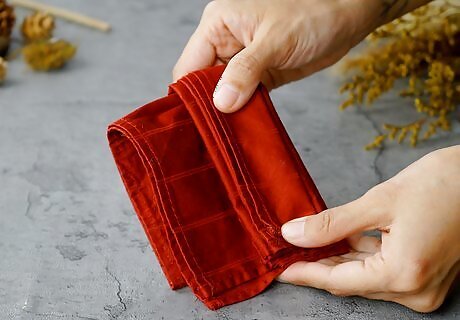
Fold everything in half. Grasping the accordion tightly in one hand, turn your entire napkin upside down. Then, fold it in half so that you create another, smaller rectangle. You want to match the edges of the accordion fold to each other and the edges of the previously unfolded area together. Press down to make a sharp crease. Now you have made the entire fan portion and have prepared the back to become the stand.
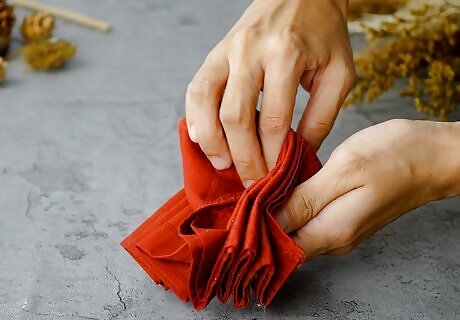
Create half of a pentagon. Grasp the upper edge of the rectangle that is unfolded. Bring it down and across so that it creates half of a pentagon that lines up with the closest edge of the fan. Press down to create a crease.
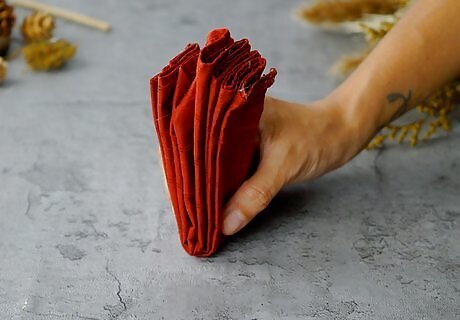
Tuck the napkin into a stand. Turn the cloth over so that the face previously lying on the table now faces upward, and vice versa. Fold up the end of the pentagon that hangs down past the accordion up into itself so that it wraps around itself. Alternatively, you can tuck the end back end into the accordion folds of the fan.
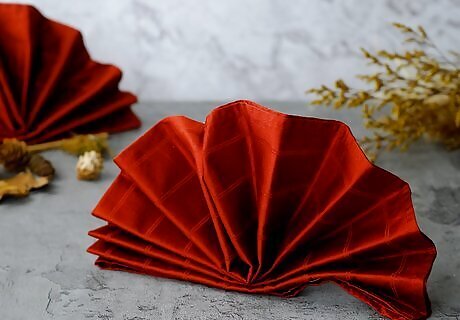
Open up the fan. Open up the last crease you just created so that the back stand forms a sort of l-shape with a portion that can lay parallel to a table or plate. Then release your grip on the accordion and spread the ends so that it "fans" out. Your standing fan napkin is now complete and ready to be displayed on a plate or table.
Folding a Fan for a Napkin Ring
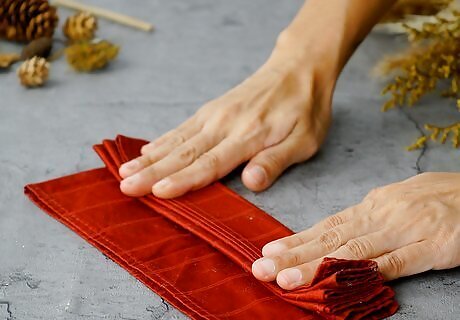
Make accordion pleats. Begin with your napkin laying as a flat, unfolded square. Make narrow accordion pleats that stack on top of one another evenly. Determine how big you want your pleats to be by making the first fold to-size. Then make the next fold twice as wide. However, before you crease that fold, fold half of the extra-large pleat the opposite direction, creating pleats identical in size to your first one. Do this for the entire length of the napkin.
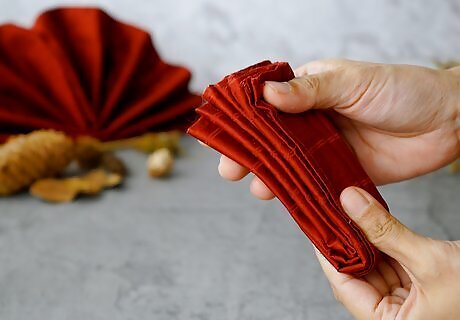
Fold the napkin in half. Take one short end of the accordion pleats (it doesn't matter which) and fold them in half on top of each other. You don't have to make the crease here particularly sharp if you don't wish to. Your accordion pleats should now be half as long but twice as thick.
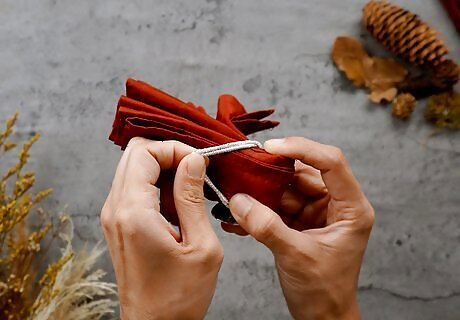
Create the tail portion of the fan. Taking your napkin ring, work it over the the folded end of the napkin. Do not push it up too high; a few centimeters to an inch should probably be plenty. You should still be able to freely spread the fan's edges; if you can't, you've slid the ring over the wrong end.
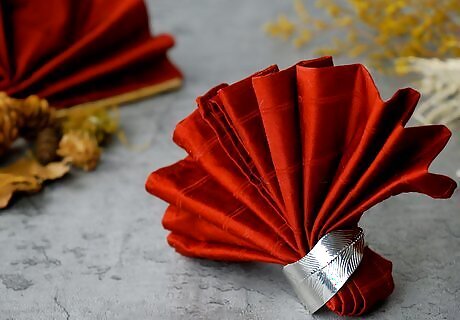
Ready the fan for display. Using your fingers, spread the fan's "blades" as large as you'd like the fan to go. Place the fan either on or next to plate for display. Unlike the standing fan, this fan displays lying down.
Selecting Good Napkins
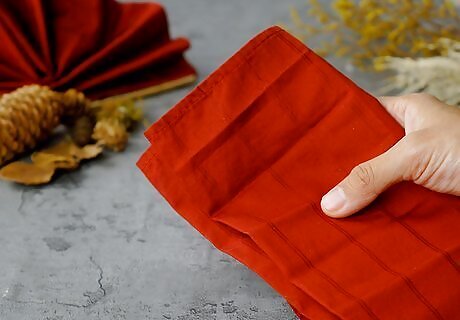
Pick a cloth napkin set. Although both cloth and paper napkins can be folded into fans, a cloth napkin will give a greater feeling of elegance to the occasion. Cloth napkins also have the additional benefit of being less wasteful: you can reuse them for multiple parties and avoid adding to a landfill by keeping and reusing them. You can buy cloth napkins at stores like Bed Bath & Beyond, Crate and Barrel, and even Amazon. Linen napkins are generally regarded as the best quality cloth napkins available, but for a more casual affair cotton is acceptable.
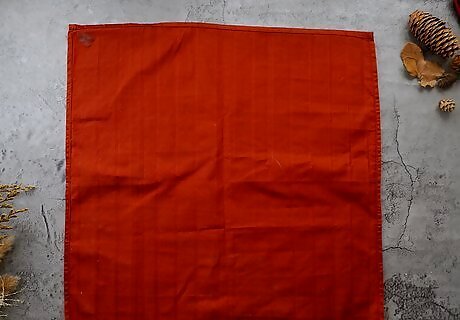
Choose a square napkin set. Although you can use rectangular napkins if you can't find a square one, square napkins are ideal. Although you may only be planning to use these napkins for fan folds this time, you may want to reuse them later with different folding techniques, and some of them do absolutely require a square napkin. You can use a T-square or two rulers aligned perpendicular to one another at a 90 degree angle to double check your napkins' squareness.
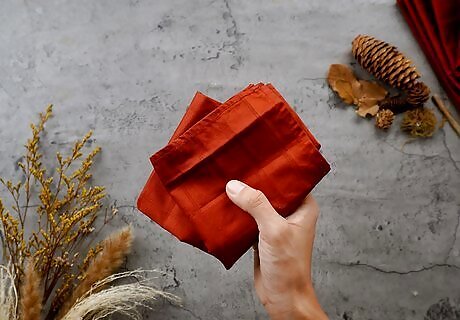
Select by color and design. Although the industry standard for napkins is white, there are a world of patterns and colors that you can explore in cloth napkins. By color coordinating your napkins to the rest of your party's or event's decor, you can make it even more memorable and special. Light colors create a sense of space. Dark colors create a more intimate atmosphere.
Preparing Your Napkins
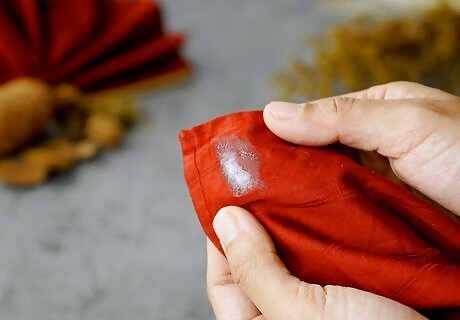
Examine the cloth and prep for stain removal. Although this will probably not be a problem if you've never used these napkins before, if this is your second or third time using these napkins, or you have rented them for the occasion, you'll want to check to make sure they're clean and stain free. It would be incredibly embarrassing for a guest to open their napkin and discover a huge grease stain on the cloth. You can treat for the following common stains like so: Food stains: use a pre-treatment solution like Shout, Spray N' Wash, or Resolve Stain Remover before washing. Follow the product's directions featured on the packaging (each product will have slightly different directions, so be careful). Candle wax: scrape off as much of the excess wax first and then place the napkin between two paper towels. Iron the tablecloth between the paper towels to soak up more of the wax. Finish with an application of Goof Off, Goo Gone, or candle wax remover. Oil or grease: apply and scrub at with clear dish soap (which is formulated to get rid of grease and oil). Red wine stains: prep the stain by applying white wine, club soda, or salt paste. Coffee stains: apply diluted vinegar and then soak the cloth in warm, not hot, water. Ink: use hairspray or denatured alcohol.
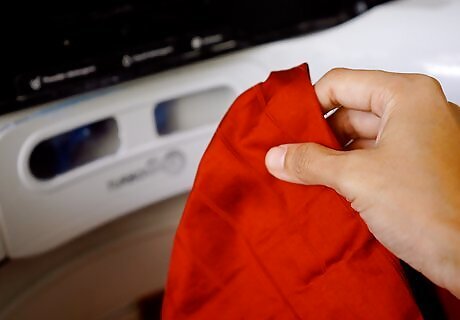
Wash your cloth napkins. Soak your linen from 8 hours to overnight in your washing machine with cool water; you should add laundry detergent to it. In the morning, drain the washing machine and refill it with hot water. Wash the cloths with as short a cycle as possible to avoid abrasions to the material and add an extra rinse cycle since linen absorbs more soap and detergent than many other materials. Do not use chlorine bleach on white linen napkins. While bleach will restore most white cloth to its original state, chlorine bleach will actually yellow linen. Avoid putting any other items in the washing machine. Other fabrics will increase the amount of friction that the linen will experience, and if they are of a different color those colors could run onto the napkins. Do not use any fabric softeners on linen. Repeat as needed if you notice any stains upon completion.
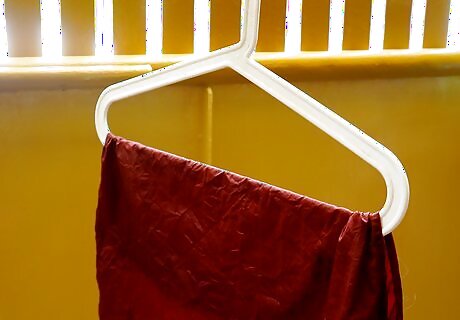
Dry your napkins. The best way to dry linen is to hang it up on a line outside using some clothing pinchers during a warm, sunny day. If it's wet and rainy outside, you can lay the napkins flat on top of some terrycloth towels inside. Finish this off by first spraying the material with starch and then ironing the napkins on a low heat. Starching and then ironing your napkins will help them to keep their form once folded and to have extra crisp creases. Do not use a mechanical dryer to dry your linen napkins. Doing so will weaken the fibers, causing them to become brittle and shortening the longevity of your napkins.



















Comments
0 comment